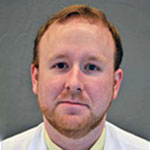Chao He, MD, PhD
Mentor: A. Brent Carter, M.D.; Victor J. Thannickal, M.D.(Co-Mentor)
Project Title: NOX4 Modulates Lung Macrophage Polarization in Pulmonary Fibrosis
Primary Research Project: Dr. He’s research is focused on defining the role of alveolar macrophages in lung fibrosis. He has previously shown that macrophages undergo different polarization process during fibrosis development and the process is regulated by redox signaling. His current work investigates NOX4 and its role in mediating lung macrophage polarization. Preliminary data from this work showed NOX4 promotes lung macrophages polarized into a pro-fibrotic phenotype via modulating mitochondrial biogenesis. He is working on generating a macrophage/monocyte specific NOX4 knock-out mice model to evaluate the role of lung macrophages in different pulmonary diseases.
Presentations/Publications (during fellowship training; T32 appointment):
He C, Larson-Casey JL, Davis D, Hanumanthu VS, Longhini ALF, Thannickal VJ, Gu L, Carter AB. Nox4 modulates macrophage phenotype and mitochondrial biogenesis in asbestosis. JCI Insight 2019. PMID: 31434799; PubMed Central PMCID: PMC6777818.
Larson-Casey JL, Vaid M, Gu L, He C, Cai GQ, Ding Q, Davis D, Berryhill TF, Wilson LS, Barnes S, Neighbors JD, Hohl RJ, Zimmerman KA, Yoder BK, Longhini ALF, Hanumanthu VS, Surolia R, Antony VB, Carter AB. Increased flux through the melvalonate pathway mediates fibrotic repair without injury. J of Clinical Investigation 2019. PMID: 31609245; PubMed Central PMCID: PMC6819144.
Professional Development: Dr. He is currently in his final (fifth) year of ABIM Research Pathway (Physician-Scientist Training Program) and nearing the completion of his first year on the Pulmonary T32. He attends Pulmonary Grand Rounds, Journal Clubs and other fellowship conferences routinely to complement his research. Dr. He presented at the 2018 American Association of Physician/American Society of Clinical Investigator Joint Meeting in April of 2018 and the 2018 and 2019 American Thoracic Society International Conferences. He plans on submitting a grant proposal for the Parker B. Francis Fellowship in 2020 and has also submitted his K08 grant and is currently awaiting scoring.
David LaFon, MD
Mentor: Moon H. Nahm MD; Mark T. Dransfield (Co-Mentor)
Project Title: Immune Responses to Pneumococcal Vaccines
Primary Research Project: Dr. LaFon’s research is focused on measuring immune responses to pneumococcal vaccines in order to characterize the immune dysfunction associated with COPD. Since current methods for diagnosing immune dysfunction are inadequate, Dr. LaFon is interested in identifying novel means of evaluating vaccine responses in clinical populations, and applying these techniques to COPD. In particular, he plans to investigate the use of multiplexed opsonophagocytosis assays (MOPA) as an indicator of pneumococcal antibody function in individuals with COPD who experience frequent infections. He is working with Dr. Mark Dransfield to apply analytical techniques used in the Nahm Lab to study clinical populations. Dr. LaFon is currently a co-investigator in a multi-site study of immune parameters in COPD. He is also analyzing vaccine response data in COPD and initiating a study of pneumococcal antibodies in COPD sera. Dr. LaFon conducted a study demonstrating that different laboratories’ assays that measure pneumococcal antibodies generate different results, with the potential to affect clinical diagnosis. He is first-author on a manuscript describing these findings which has been accepted to the Journal of Allergy and Clinical Immunology.
Presentations/Publications (during fellowship training; T32 appointment):
LaFon DC, Nahm MH. Measuring quantity and function of pneumococcal antibodies in immunoglobulin products. Transfusion 2018. PMID: 30536435
LaFon DC, Nahm M. Inter-laboratory variability in multiplexed pneumococcal antibody testing. J Allergy Clin Immunology 2018. PubMed PMID: 30468776.
LaFon DC, Nahm MH. Measuring immune responses to pneumococcal vaccines. J Immunol Methods 2018. PMID:30098317; PubMed Central PMCID: PMC6169307.
LaFon DC, Bhatt SP, Labaki WW, Rahaghi FN, Moll M, Bowler RP, Regan EA, Make BJ, Crapo JD, San Jose Estepar R, Diaz AA, Silverman EK, Han MK, Hobbs B, Cho MH, Washko GR, Dransfield MT, Wells JM. Pulmonary artery enlargement and mortality risk in moderate to severe COPD: results from COPDGene. Eur Resp J 2019, PMID: 31772001; PubMed Central PMCID: PMC5812765.
Professional Development: Since joining the T32, Dr. LaFon has been first author on three peer-reviewed manuscripts written with Dr. Nahm that have been accepted or published. In addition to the manuscript accepted to Journal of Allergy and Clinical Immunology, one manuscript has been published in Journal of Immunological Methods, and another accepted for publication in Transfusion. He regularly attends pulmonary division didactic lectures and conferences. He is planning a K23 submission in middle of 2020.
Kayla Goliwas, PhD
Mentor: Jessy Deshane, Ph.D.; Victor J. Thannickal, M.D. (Co-Mentor)
Project Title: Tissue Engineered Three-Dimensional Models of Lung Disease
Primary Research Project: Dr. Goliwas’ research is focused on generating representative in vitro models of lung carcinoma that include components of the tumor microenvironment, namely immune cell subsets and fibroblasts within a volume of extracellular matrix, as currently no in vitro tumor models that are considered immune competent exist. The function of the immune system within the tumor microenvironment is complex, with accumulating data indicating a cancer-promoting effect in many established tumors as tumor cells are able to evade immune detection through multiple mechanisms. In recent years, modulation of the patients’ immune system has been utilized as a treatment strategy with some success, yet many patients do not respond or are not eligible for current immune targeted therapies. Combining methods within biomedical engineering, cell biology, and tumor immunology, Dr. Goliwas will develop novel models, or tumor mimics, to better recapitulate human malignancy. Real-time changes in the immune cell phenotype and exosome profile within the engineered tumor mimics will be evaluated to monitor how these changes influence T cell exhaustion with and without immune targeted therapy, providing human-specific data to answer a complex question that are difficult to address clinically. These mimics will allow for better understanding of tumor-immune cell cross talk and efficacy of immunotherapy. The proposed tumor mimics have the potential to be utilized in studies involving tumor biology, drug development and personalized medicine, providing an innovative way to study possible changes to the immune milieu in vitro. These tumor mimics have the potential to elucidate changes in tumor-immune interactions, and thereby response to immunotherapy, in both a cancer mutation-status/subtype-specific and potentially patient-specific manner.
Presentations/Publications (during fellowship training; T32 appointment):
Wang Y, Goliwas KF, Severino PE, Hough KP, Van Vessem D, Wang H, Koomulli RP, Frost AR, Ponnazhagen S, Berry JL, and Deshane JS. Mechanical strain induces phenotypic changes in breast cancer cells and promotes immunosuppression in the tumor microenvironment. in revision for Molecular Cancer Research.
Hough KP, Trevor JL, Chacko BK, Strenkowski JG, Wang Y, Goliwas KF, Bone NB, Vang S, Bodduluri S, Steele C, Tousif S, Chin J, Chanda D, Zmijewski J, Antony VB, Dokland T, Mitra K, Zhang J, Duncan SR, Thannickal VJ, Gabrielsson S, Darley-Usmar VM, and Deshane JS. Exosomal transfer of mitochondria and T helper polarization in asthmatics. In Preparation for submission to Cell.
Goliwas KF, Hough KP, Merritt RK, Ashraf H, Jaskula-Stzul R, Berry JL, and Deshane JS. Tumor-stromal interactions are mediated by extracellular vesicles in engineered lung tumor mimics. In Preparation for submission to The Journal of Immunology.
Goliwas KF, Wang Y, Berry JL, Donahue JM, and Deshane JS. Patient-derived engineered lung tumor mimics maintain tissue heterogeneity and allow for assessment of tumor-stromal interactions. In Preparation for submission to Nature Methods.
Professional Development: Dr. Goliwas was recruited to this T32 Training after recently completing her Ph.D. training in Cellular and Molecular Biology at Vanderbilt University. She has already begun to generate interesting new findings of tumor cell-immune interactions that was presented at the 2019 American Thoracic Society Conference; she is first-author on multiple manuscripts that are in-preparation and is first author on a paper currently in revision. She plans on submitting a Parker B Francis grant in 2020.
Sarah Robison, MD
Mentor: Amit Gaggar, M.D. Ph.D.; J. Edwin Blalock, Ph.D. (Co-Mentor)
Project Title: Regulation of the Matrikine Proline-Glycine-Proline by Peptide Transporters in Lung Disease
Primary Research Project: Dr. Robison is currently a second-year fellow in Dr. Gaggar’s laboratory, working on a project to study the regulation of the matrikine PGP in the inflamed lung. Her work relates to a novel mechanism involving the transport of this peptide out the lung by the peptide transporter PepT2. This project will provide a translational platform for the development of new approaches to the treatment of chronic inflammation. Her first-authored manuscript related to this work has been submitted for publication.
Presentations/Publications (during fellowship training; T32 appointment):
Robison SW, Margaroli C, Li Jindong, Snelgrove R, Blackburn JP, Blalock JE, Xu X, Gaggar A. A novel mechanism of active matrikine regulation in acute pulmonary inflammation. Submitted to Journal of Clinical Investigation.
Professional Development: Based on Dr. Robison’s exemplary research performance during the second year of her fellowship, we have committed to recruiting her to our Pulmonary T32 Training Program, starting at the beginning of her third year in the fellowship program (July, 2019). She presented her research at the 2019 International American Thoracic Society meeting in Dallas, TX.
Chad Wade, MD
Mentor: J. Michael Wells, MD MPH
Project Title: Prognostic Implications and Mechanisms of Pulmonary Vascular Disease in COPD
Primary Research Project: Dr. Wade is currently a third-year fellow in the laboratory of Dr. J. Michael Wells investigating the role of pulmonary vascular disease in the setting of chronic obstructive lung disease with a specific eye towards utilizing computed tomographic imaging biomarkers to identify these subjects. His current project utilizes the COPDGene cohort to understand the prognostic implications of pulmonary vascular disease in smokers. Additional work using patient samples from a biorepository generated as part of the Pulmonary Hypertension Breakthrough Initiative compared transcriptomic profiles between samples from subjects with WHO Group I Pulmonary Hypertension and healthy controls to elucidate novel mechanistic pathways in the development of primary pulmonary hypertension. The experience gained from both of these projects will serve as a foundation to initiate an endeavor leveraging transcriptomic and proteomic data obtained as part of COPDGene with a goal to elucidate the mechanistic underpinnings of pulmonary vascular disease in COPD.
Presentations/Publications (during fellowship training; T32 appointment):
Wade. R. C., Wells, J.M. et al. Transcriptome Analysis of Muscularized Vessels in Pulmonary Arterial Hypertension. ATS Annual Meeting Abstracts 2020.
Wade, R. C., Wells, J.M. et al. Pulmonary Arterial Enlargement is Associated with Severe Exacerbations and Mortality in Ever Smokers with Preserved Ratio and Impaired Spirometry (PRISm): Findings from COPDGene. ATS Annual Meeting Abstracts. 2020. (Presented for the COPDGene working group May 2020)
Wade, C., & Wells, J. M. (2020). Practical recommendations for the use of beta-blockers in chronic obstructive pulmonary disease. Expert Rev Respir Med, 1-8. doi:10.1080/17476348.2020.1752671
Wade, R. C., & Wells, J. M. (2020). POINT: Are Eosinophils Useful for the Management of COPD? Yes. Chest, 157(5), 1073-1075. doi:10.1016/j.chest.2019.12.043
Wade, R. C., & Wells, J. M. (2020). Rebuttal From Drs Wade and Wells. Chest, 157(5), 1078-1079. doi:10.1016/j.chest.2019.11.052
Takudzwa Mkorombindo, MD
Mentor: Steven R. Duncan and Mark T. Dransfield
Project Title: HLA-C and Killer Cell Immunoglobulin-Like Receptor Permutations on COPD
Primary Research Project: Dr. Mkorombindo is a third-year fellow focused on identifying determinants of disparate outcomes in Chronic Obstructive Pulmonary disease. Having witnessed the disproportionate impact this disease has on marginalized communities and populations, he seeks to understand immunologic underpinnings that may be responsible for adverse COPD outcomes. Co-mentored by Mark Dransfield and Steven Duncan, he has a particular interest in the pathogenesis and identification of early and rapidly progressive disease. To do this, he works in the lab of Steven Duncan, evaluating the role of innate immunity in COPD. He is interested in the role of natural killer cells and the role of natural killer (NK) cell receptors in the pathogenesis and progression of COPD. Dr. Mkorombindo’s research focuses on how interactions between killer-cell immunoglobulin-like receptors (KIR) on NK cell surfaces and HLA-Class I molecules expressed on target cells modulate NK cell cytotoxicity.
Presentations/Publications (during fellowship training; T32 appointment):
Mkorombindo T., Duncan, S.R. et al. The Association of HLA-C and Killer Cell Immunoglobulin-Like Receptor Permutations on COPD Risk. ATS Annual Meeting Abstracts 2020.
Mkorombindo T., Duncan, S.R. et al. Correlates of Survival After Autoantibody Reduction Therapy (ART) for Acute IPF Exacerbations. ATS Annual Meeting Abstracts 2020.
Mkorombindo T, Dransfield MT. Mepolizumab in the treatment of eosinophilic chronic obstructive pulmonary disease. International Journal of Chronic Obstructive Pulmonary Disease, Volume 14, 1779–1787. doi.org/10.2147/COPD.S162781
Mkorombindo T, Dransfield MT. COPD exacerbations and MACE: More than a chance encounter? Respirology, 24(12), 1129–1130. doi.org/10.1111/resp.13683
Mkorombindo T, Dransfield MT. Eosinophil-guided treatment of COPD exacerbations: unfinished business. Lancet Respiratory Medicine, The, 2019-08-01, Volume 7, Issue 8, Pages 647-648. doi.org/10.2147/COPD.S162781
Burkes R.M., Mkorombindo T., Chaddha U, Bhatt A, El-Kersh K, Cavallazzi R, Kubiak N. Impact of Quality Improvement on Care of Chronic Obstructive Pulmonary Disease Patients in an Internal Medicine Resident Clinic. Healthcare (Basel). 2018 Jul;6(3). doi.org/10.3390/healthcare6030088





